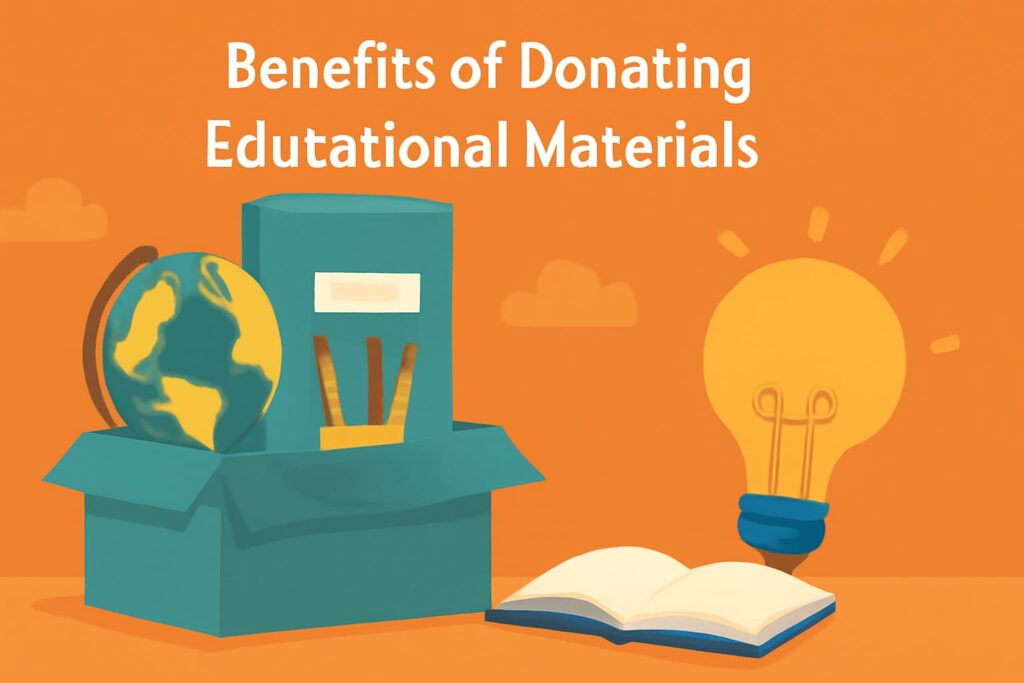In today’s world, education is a cornerstone of progress and development. However, not everyone has access to the resources they need to succeed academically. Many NGOs (Non-Governmental Organizations) work tirelessly to bridge this gap by providing educational materials to underprivileged communities. By donating educational materials to NGOs, you can play a pivotal role in creating a brighter future for countless individuals. This blog explores the importance of donating educational materials, how it supports education, and the long-term benefits it brings to communities around the world.
Why Donate Educational Materials?
Donating educational materials such as books, stationery, school supplies, and even digital resources can significantly enhance the learning experience for students, particularly in underserved areas. Many schools in low-income regions struggle with limited resources, making it difficult for students to access quality education. By providing educational materials, you can help these communities overcome challenges and ensure that students have the tools they need to succeed.
Benefits of Donating Educational Materials
- Promoting Equal Access to Education
Education is a fundamental right, yet millions of children worldwide still lack access to essential educational tools. By donating to NGOs, you ensure that educational resources reach students who might not otherwise have them. - Improving Literacy and Academic Performance
Access to books and learning materials has a direct impact on a student’s literacy level and overall academic performance. When students have the right tools, they can engage more effectively with their studies, leading to improved results and better opportunities for the future. - Building Long-term Social Impact
Education is one of the most powerful tools for breaking the cycle of poverty. By supporting NGOs with educational donations, you’re contributing to the development of skilled individuals who can go on to make a positive impact in their communities. - Supporting Educational Equity
Donating educational materials to NGOs helps bridge the gap between wealthy and underserved communities. It ensures that all children, regardless of their socioeconomic background, have access to quality education, fostering social equity. - Empowering Communities
NGOs are deeply embedded in the communities they serve. By partnering with them through material donations, you help empower local educators and students, giving them the necessary tools to thrive.

How to Donate Educational Materials to NGOs
Donating to NGOs is relatively simple, but it’s important to approach it in a way that maximizes the impact of your contribution. Here are a few tips for donating educational materials:
1. Research the NGO’s Needs
Before making a donation, it’s essential to understand the specific needs of the NGO you’re supporting. Some NGOs may focus on providing books, while others might need computers, writing materials, or even art supplies. By learning about their goals, you can make a donation that truly benefits the organization and its recipients.
2. Ensure the Materials Are Appropriate
Ensure that the materials you are donating are age-appropriate, culturally relevant, and in good condition. For instance, school books in one language may not be useful in a community that speaks a different language. Always check the specific guidelines set by the NGO to make sure your contribution is valuable.
3. Look for Local and International NGOs
Depending on your location, you can either donate locally or contribute to international NGOs that operate in areas with high educational needs. Both options offer meaningful ways to contribute to educational development.
4. Consider Monetary Donations for Material Purchases
While donating physical materials is highly valuable, some NGOs may prefer monetary donations. These funds can be used to purchase specific items needed in real-time, such as books, laptops, or educational software.
5. Get Involved Beyond Donations
Apart from donating materials, consider becoming involved in the educational initiatives of NGOs. Volunteering your time to assist in teaching or organizing educational events can also make a significant difference.
The Role of NGOs in Education
NGOs play a crucial role in providing educational resources to communities that lack access to proper schooling. They often work in partnership with local governments to fill gaps in educational services. Here’s how they contribute:
1. Grassroots Support
NGOs are often more flexible and adaptable than governmental institutions, allowing them to provide direct, community-based support where it’s needed most. They focus on local needs, whether it’s building schools, offering literacy programs, or donating educational supplies.
2. Building Sustainable Education Models
Many NGOs work on creating long-term educational solutions, such as setting up libraries, training teachers, and creating scholarship programs. Their goal is not just short-term relief, but to create sustainable education models that will benefit future generations.
3. Advocacy for Education Access
NGOs often act as advocates for equal education access. They campaign for policy changes, raise awareness, and work to influence educational reforms, ensuring that education becomes more accessible to marginalized groups worldwide.
How Donating Educational Materials Strengthens Global Education
By supporting NGOs with educational material donations, you’re playing a key role in advancing global education. In many developing regions, access to even basic educational tools is limited, and NGOs bridge this gap through their initiatives. The combined efforts of donors, NGOs, and local communities can transform lives, one student at a time.
Global Impact
- Increased literacy rates: Donations help improve literacy and numeracy skills across different regions.
- Technological access: By donating computers or digital learning resources, you can help bridge the digital divide.
- Sustainable development: Empowering children through education ensures a brighter, more sustainable future for the next generation.
Read Also:How Your Donation Can Change a Child’s LifeConclusion
Donating educational materials to NGOs is a simple yet powerful way to make a difference. It supports the efforts of these organizations in providing quality education to communities that need it the most. Whether you choose to donate books, supplies, or funds to purchase educational resources, your contribution can help improve literacy, academic performance, and create long-term benefits for entire communities. By supporting educational initiatives, you’re investing in a future where all children have the opportunity to succeed. Start today—your donation could change a life tomorrow.
FAQ’s: How Donating Educational Materials to NGOs Makes a Lasting Impact
What types of educational materials can I donate?
Books, stationery, computers, educational software, art supplies, and teaching resources are commonly needed by NGOs.
Can I donate used books or materials?
Yes, as long as they are in good condition and appropriate for the intended audience, used materials are welcomed by many NGOs.
Do all NGOs accept donations of educational materials?
Not all NGOs may require educational materials. It’s important to research and find those specifically focusing on education.
How can I find an NGO to donate to?
You can search online for education-focused NGOs or reach out to local organizations to learn about their needs.
Can I donate money instead of materials?
Many NGOs accept monetary donations, which can be used to purchase the most needed materials for their educational programs.





